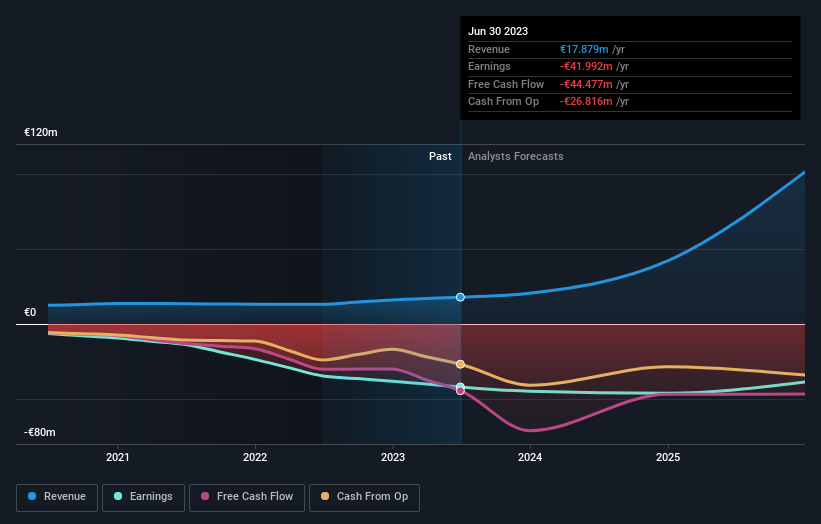McPhy Energy S.A.'s (EPA:MCPHY) last week's 10% decline must have disappointed individual investors who have a significant stake

Key Insights
- McPhy Energy's significant individual investors ownership suggests that the key decisions are influenced by shareholders from the larger public
- The top 19 shareholders own 50% of the company
- 15% of McPhy Energy is held by Institutions
If you want to know who really controls McPhy Energy S.A. (EPA:MCPHY), then you'll have to look at the makeup of its share registry. And the group that holds the biggest piece of the pie are individual investors with 52% ownership. In other words, the group stands to gain the most (or lose the most) from their investment into the company.
And last week, individual investors endured the biggest losses as the stock fell by 10%.
Let's take a closer look to see what the different types of shareholders can tell us about McPhy Energy.
View our latest analysis for McPhy Energy

What Does The Institutional Ownership Tell Us About McPhy Energy?
Institutions typically measure themselves against a benchmark when reporting to their own investors, so they often become more enthusiastic about a stock once it's included in a major index. We would expect most companies to have some institutions on the register, especially if they are growing.
We can see that McPhy Energy does have institutional investors; and they hold a good portion of the company's stock. This suggests some credibility amongst professional investors. But we can't rely on that fact alone since institutions make bad investments sometimes, just like everyone does. If multiple institutions change their view on a stock at the same time, you could see the share price drop fast. It's therefore worth looking at McPhy Energy's earnings history below. Of course, the future is what really matters.

Hedge funds don't have many shares in McPhy Energy. Our data shows that EDF Pulse Ventures is the largest shareholder with 14% of shares outstanding. Meanwhile, the second and third largest shareholders, hold 7.6% and 6.0%, of the shares outstanding, respectively.
Looking at the shareholder registry, we can see that 50% of the ownership is controlled by the top 19 shareholders, meaning that no single shareholder has a majority interest in the ownership.
Researching institutional ownership is a good way to gauge and filter a stock's expected performance. The same can be achieved by studying analyst sentiments. There are plenty of analysts covering the stock, so it might be worth seeing what they are forecasting, too.
Insider Ownership Of McPhy Energy
While the precise definition of an insider can be subjective, almost everyone considers board members to be insiders. Company management run the business, but the CEO will answer to the board, even if he or she is a member of it.
Insider ownership is positive when it signals leadership are thinking like the true owners of the company. However, high insider ownership can also give immense power to a small group within the company. This can be negative in some circumstances.
We can see that insiders own shares in McPhy Energy S.A.. As individuals, the insiders collectively own €3.4m worth of the €149m company. Some would say this shows alignment of interests between shareholders and the board, though we generally prefer to see bigger insider holdings. But it might be worth checking if those insiders have been selling.
General Public Ownership
The general public -- including retail investors -- own 52% of McPhy Energy. With this amount of ownership, retail investors can collectively play a role in decisions that affect shareholder returns, such as dividend policies and the appointment of directors. They can also exercise the power to vote on acquisitions or mergers that may not improve profitability.
Private Equity Ownership
With a stake of 20%, private equity firms could influence the McPhy Energy board. Some investors might be encouraged by this, since private equity are sometimes able to encourage strategies that help the market see the value in the company. Alternatively, those holders might be exiting the investment after taking it public.
Private Company Ownership
It seems that Private Companies own 3.9%, of the McPhy Energy stock. It's hard to draw any conclusions from this fact alone, so its worth looking into who owns those private companies. Sometimes insiders or other related parties have an interest in shares in a public company through a separate private company.
Public Company Ownership
Public companies currently own 6.9% of McPhy Energy stock. We can't be certain but it is quite possible this is a strategic stake. The businesses may be similar, or work together.
Next Steps:
It's always worth thinking about the different groups who own shares in a company. But to understand McPhy Energy better, we need to consider many other factors. Be aware that McPhy Energy is showing 1 warning sign in our investment analysis , you should know about...
Ultimately the future is most important. You can access this free report on analyst forecasts for the company.
NB: Figures in this article are calculated using data from the last twelve months, which refer to the 12-month period ending on the last date of the month the financial statement is dated. This may not be consistent with full year annual report figures.
New: Manage All Your Stock Portfolios in One Place
We've created the ultimate portfolio companion for stock investors, and it's free.
• Connect an unlimited number of Portfolios and see your total in one currency
• Be alerted to new Warning Signs or Risks via email or mobile
• Track the Fair Value of your stocks
Have feedback on this article? Concerned about the content? Get in touch with us directly. Alternatively, email editorial-team (at) simplywallst.com.
This article by Simply Wall St is general in nature. We provide commentary based on historical data and analyst forecasts only using an unbiased methodology and our articles are not intended to be financial advice. It does not constitute a recommendation to buy or sell any stock, and does not take account of your objectives, or your financial situation. We aim to bring you long-term focused analysis driven by fundamental data. Note that our analysis may not factor in the latest price-sensitive company announcements or qualitative material. Simply Wall St has no position in any stocks mentioned.
About ENXTPA:ALMCP
McPhy Energy
Designs and manufactures a range of hydrogen production and valorization equipment in France, Italy, and Germany.
Slight and fair value.
Similar Companies
Market Insights
Community Narratives


